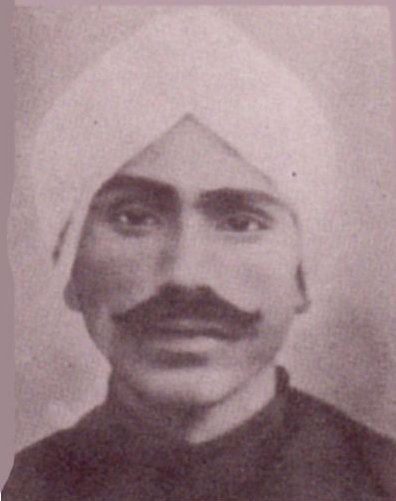The word romantic poet does not convey the correct picture as much as the term “Sringaar ras ke kavi” (a poet who uses sringaar ras). Normally any song on gods and goddesses abound in bhakti ras or the feeling of devotion. For Bharathi, it is Sringaar ras that dominates Bhakti Ras even in such songs.
 Bharathiyaar always addressed gods and goddesses in very familiar terms; many a time using words of endearment rather than supplication; words like காதல் , மையல் ,மோகம் and so on,that are generally used in love songs. That’s the tone of his poem,”மூன்று காதல் ” or three love affairs. It’s only too apt to talk of these ‘love affairs’ during navaratri celebrations .
Bharathiyaar always addressed gods and goddesses in very familiar terms; many a time using words of endearment rather than supplication; words like காதல் , மையல் ,மோகம் and so on,that are generally used in love songs. That’s the tone of his poem,”மூன்று காதல் ” or three love affairs. It’s only too apt to talk of these ‘love affairs’ during navaratri celebrations .

The poem moonru kaathal (மூன்று காதல் )has nine stanzas; four on Saraswathi, three on Lakshmi and two on Parashakthi.
It goes without saying that for Bharathi, his first love had always been Saraswathi or the goddess of learning. That’s how he earned the title Bharathi at a young age of eleven years. In a way, Saraswathi resided in Bharathiyaar’s home and Bharahthiyaar himself was a manifestation of the goddess Saraswathi.
When he talks of Saraswathi, it’s clearly love at first sight. As a young child hopping along the street, he sees her waiting for him at the street corner reading for him from her books; when he is sitting alone at the river side all by himself, the goddess brings him some wonderful poetry . He constantly keeps hearing the lilting melodies from Saraswathi’s Veena everywhere. It was her words of wisdom and knowledge that nourished him . Probably he was totally enchanted by Saraswathi in his childhood which lasted till he lost his father at a young age of 15 years.
May be it was only then he longed for Goddess Lakshmi. It is not that he did not sing in praise of Lakshmi or that he was averse to wealth; but his love for Saraswathi and Kali was so intense that Laksmi kept away from his home barring a few short periods. He was always on a kind of self imposed poverty. His pride did not let him go after money and his well wishers had to be extra cautious in providing for him without hurting his ego. On one occasion he threw away money on the street, lamenting that people respected only money and not his learning.
For Bharathi , grace of Lakshmi meant not having to bother about day to day issues so that he could spend his day fruitfully, wooing Saraswathi or praising Parashakthi. He never could find favour with Lakshmi . He says in the poem ,”for whatever fault of mine, you are ignoring me”. Then he reconciles that it was only the homes of kings and and their henchmen that Laksmi visited.
As for his third love, Kali or Parashakti, it became more and more intense with time. Bharthiyaar loved physical strength and energy, attributes through which Parashakti manifests herself. Though he was a bundle of energy, physical strength , definitely, was not his forte. He could not participate , leave alone excel, in activities like swimming , wrestling or sword-fighting; he would keep watching with admiration , people engaged in such sports. In his appeal to Parashakthi , he says,
நல்லதோர் வீணை செய்தே – அதை நலங்கெடப் புழுதியில் எறிவதுண்டோ? சொல்லடி சிவசக்தி – எனைச் சுடர்மிகும் அறிவுடன் படைத்துவிட்டாய். வல்லமை தாராயோ, – இந்த மாநிலம் பயனுற வாழ்வதற்கே?
Will anyone make a beautiful veenai and throw it in the dust?
You have given me extraordinary intellect ; wont you give me the physical strength to serve the society.
Later, in many of his songs he perceived Parashakthi as the all encompassing primordial energy that sustains the whole universe, as he says “யாதுமாகி நின்றாய் காளி ! எங்கும் நீ நிறைந்தாய்” You are everything and your are everywhere O Kali”
There are a number of lovely songs on Saraswathi , the most popular one being “வெள்ளைத் தாமரைப் பூவில் இருப்பாள்” and “வெள்ளைக் கமலத்திலே ” . Here I have given the song rendered by Raj Kumar Bharathi, a great grandson of Bharathiyaar.
The most popular poem on his second love is malarin mevu thiruve (மலரின் மேவு திருவே ) . I like the song as rendered by Seergazhi Govindarajan for the crystal clear lyrics. The humanist in the poet says with Lakshmi’s grace he would wipe out the words “not available” from this world. His idea of progress was a world where no one would ever be wanting for basic necessities.
செல்வ மெட்டு மெய்தி - நின்னாற்
செம்மை யேறி வாழ்வேன்
இல்லை என்ற கொடுமை - உலகில்
இல்லை யாக வைப்பேன் .
Incidentally , though he could never ensure availability of provisions at home , he ensured that the words “not available ” was never ever spoken. So, at times his wife Chellammal had to use code words to convey to him that there was not a single grain of rice at home!
The song Yaadhumaki ninral (யாதுமாகி நின்றாள் ) is quite popular among many great singers. I have given here a version by a great admirer of Bharathiyaar and an accomplished practicer of Carnatic Music Vijayalakshmi Subramanian, rendered without any accompaniments, during these covid times.
It is difficult to do a word by word translation from Tamil and yet preserve the beauty of the ideas. If you can follow the words , it is absolutely bliss when passionately rendered by a Bharathi Bhakt

